How to prepare (your) child for nursery (pre) school (full information) | Different reasons why you should enroll your child to preschool | What is the best age to start preschool? | How do I prepare my child for daycare? | How long does it take a 3 year old to adjust to preschool? | Preschool preparation activities
Hello friends, how are you doing today? Welcome to #Relationships-Parenting website / blog.
Let you and your well-wishers live a happy and prosperous life through out your life term.
In this website / blog, you will always learn about #Relationships #Parenting.
Also subscribe / follow to our various social media networks from here to learn more about #Relationships #Parenting:
Just before going to “How to prepare (your) child for nursery (pre) school (full information) | Different reasons why you should enroll your child to preschool | What is the best age to start preschool? | How do I prepare my child for daycare? | How long does it take a 3 year old to adjust to preschool? | Preschool preparation activities“, let us know a brief, basic and very important information.
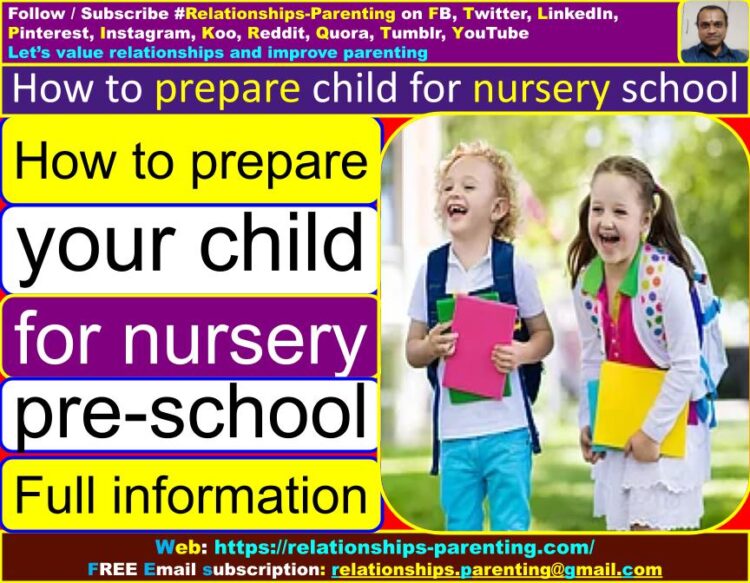
Some of the frequently asked questions (FAQs) about this subject is as given below:
What is the best age to start nursery | What should I teach my 3 year old in preschool | What should a child know in nursery | What is the most important thing in a nursery |
What questions are asked in a nursery | What subjects are taught in nursery | What activities do babies do at nursery | Preparing for preschool checklist | How to settle a child in preschool |
How to prepare 3 year old for nursery | How to prepare toddler for preschool | Preschool requirements for child | How to prepare 2 year old for preschool |
Parental guidance for preparing a preschool child for schooling ppt | How to prepare my child for kindergarten | And many more…
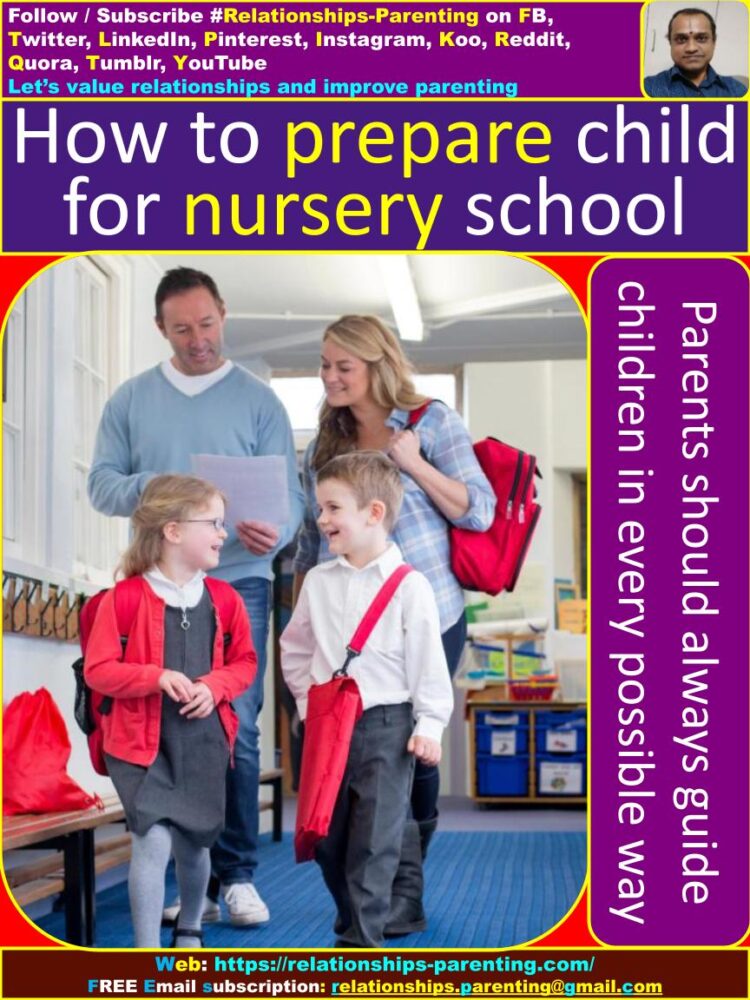
Let’s know the answers to all these and more, step by step and by point by point.
Creche or Pre-Primary : This schooling spans from 6 weeks to 6 years of age (Suggestion: Please see your country standards for more information on age.)
It is an educational daycare and childcare service. Here parents can enroll their child prior to primary schooling. This can be used to provide services for children younger than Kindergarten (kg), particularly in countries where Kindergarten is statutory.
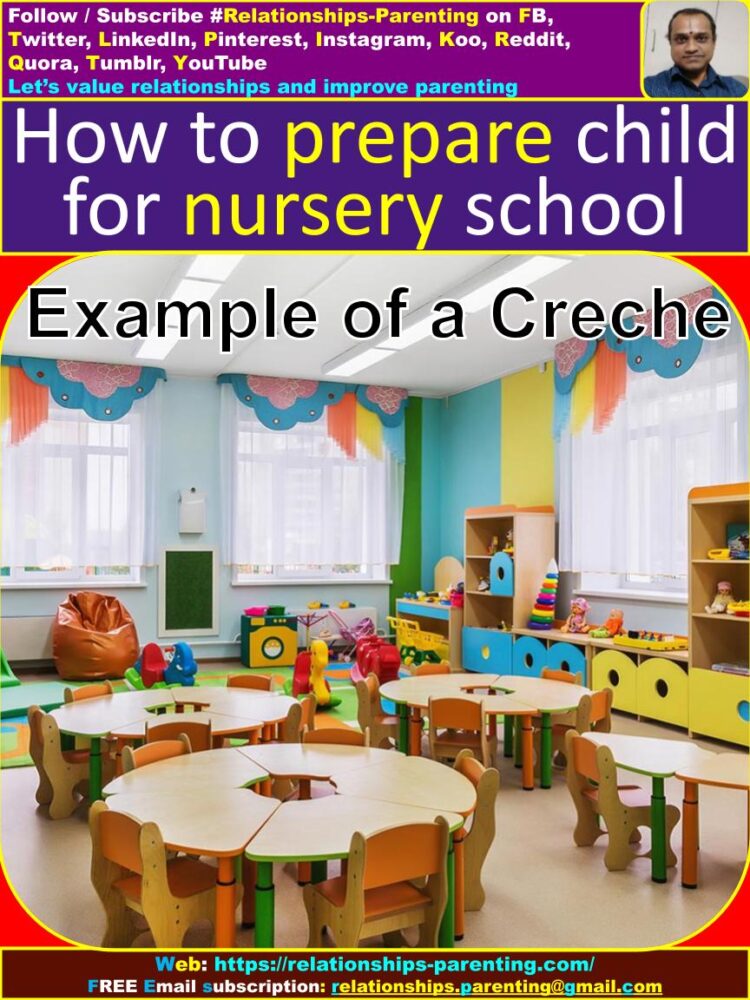
Nursery school : This schooling takes place from the age of 0 months to 5 years old (Suggestion: Please see your country standards for more information on age.)
Nursery schooling is also called as pre-primary education child care institution which includes Preschool.
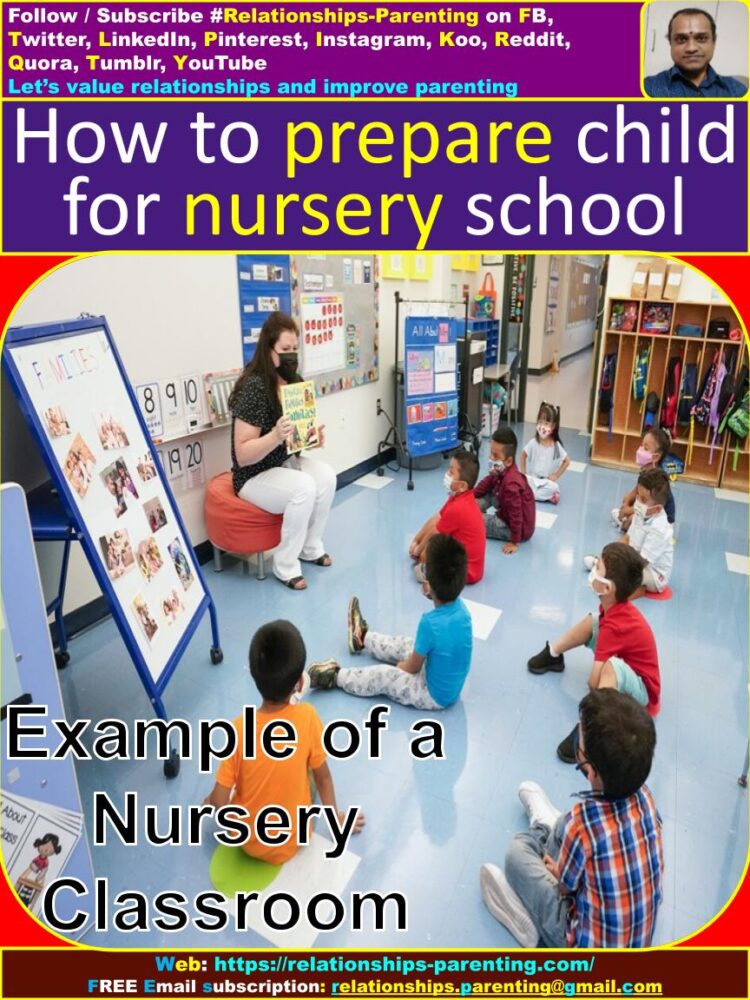
Preschool : It is for the children from the age of 2 to 5 years old (Suggestion: Please see your country standards for more information on age.)
Preschool educational system is very important and beneficial for any child attending nursery school, as it gives the child a good basic start through social interconnection.
A child in preschool learns about his environment and how to communicate verbally with others through learning based on cognitive, mental and physical development. Children who attend preschool, learn how the world around them works through playfulness and simple interactions.
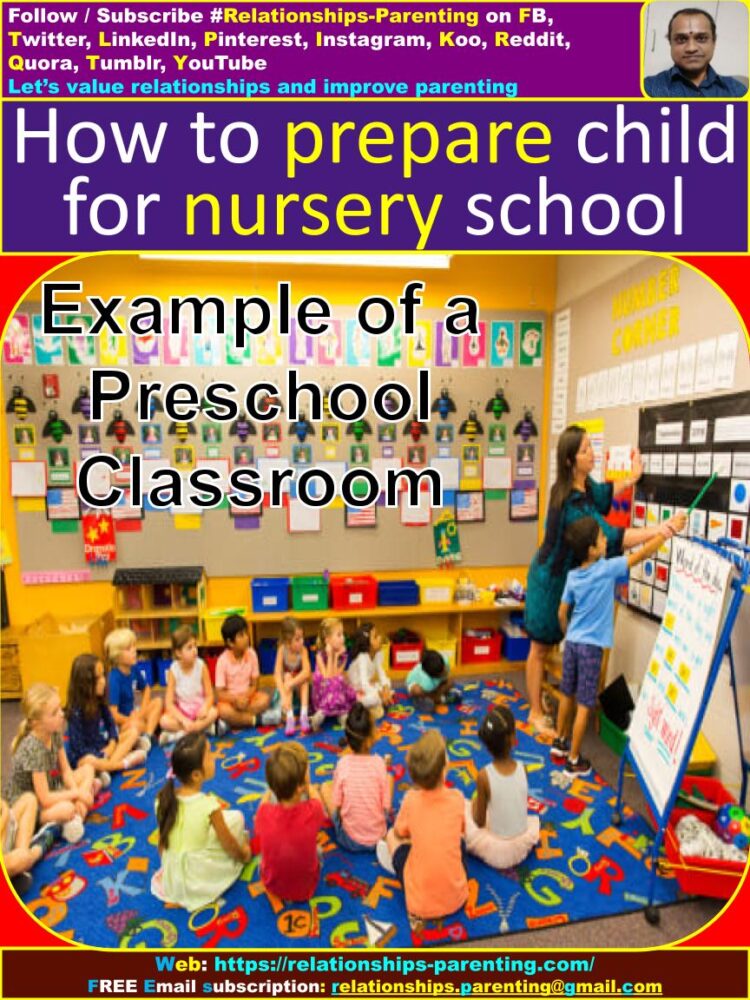
Pre-Kindergarten (Pre-K) : It is for the children from the age of 4 to 5 years old (Suggestion: Please see your country standards for more information on age.)
It takes place in a nursery school and is an initiative to enhance child’s access to pre-primary schools. Here, there is more than just teaching the child about lines, colors, numbers, shapes and so on.
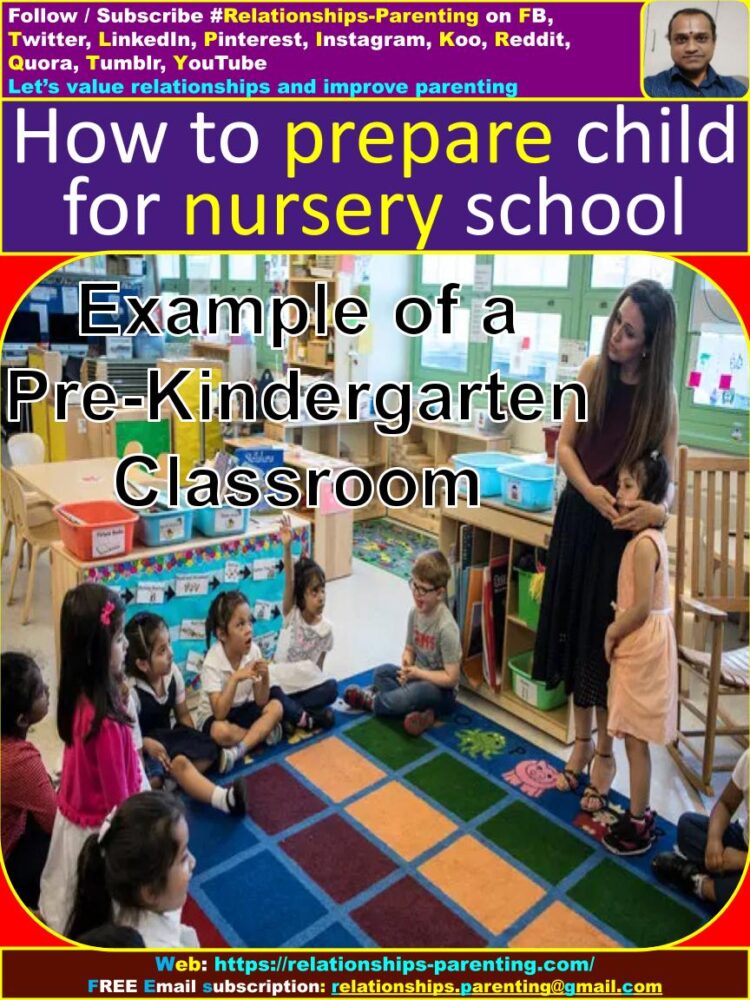
Kindergarten (KG) : It is for the children from the age of 5 to 6 years old (Suggestion: Please see your country standards for more information on age.)
It is usually held in a nursery school and/or some primary elementary schools. In many parts of the world it is referred to as the initial stages of formal education.
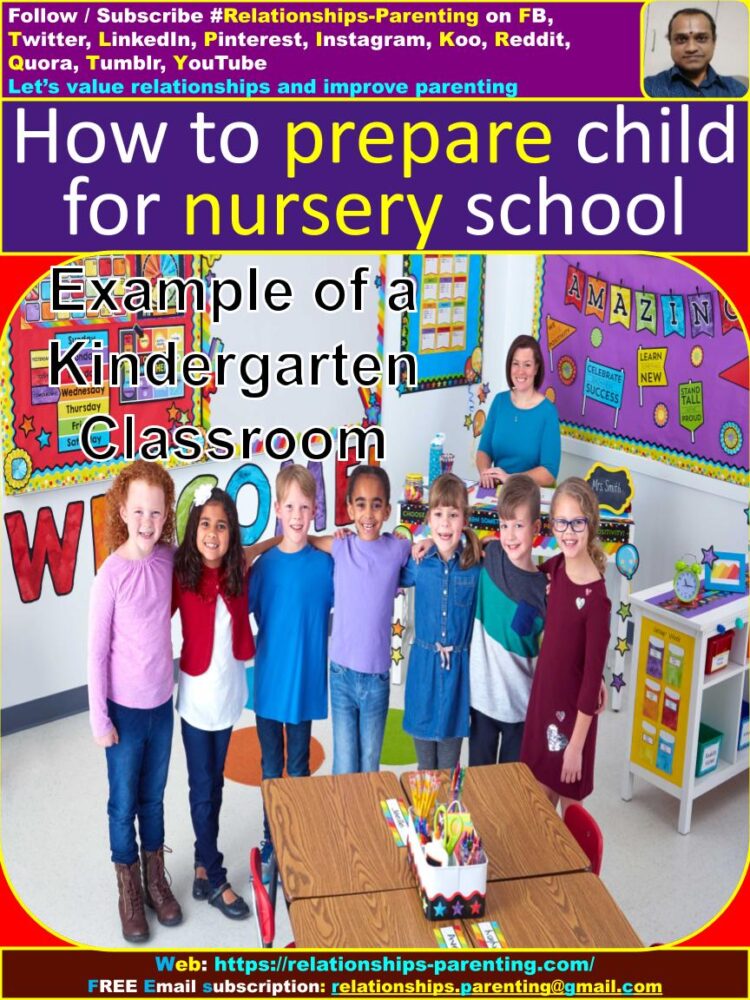
List of points about “How to prepare (your) child for nursery (pre) school (full information) | Different reasons why you should enroll your child to preschool” is as given below:
Go along with your child : Make sure you plan to visit your child’s new school with him/her before his/her first day. Play together on the playground in the school premises and explore the classroom along with your child.
This will give them a better idea of how enjoyable their school will be when they start school with other children. Walk across the school with your cute baby.
When school is in session, try to take your child to the school premises, so that he or she can see other children enjoying the play there.
Seeing other kids having fun at school premises will not only help your child feel more comfortable with the idea of going to school, but it will also be more enjoyable.
Tell the child how happy the children already in the nursery look, how happy and engaged they all are. Don’t be shy to ask your child as many questions as you can think of, so that you give the best and clearest picture of what works in school.
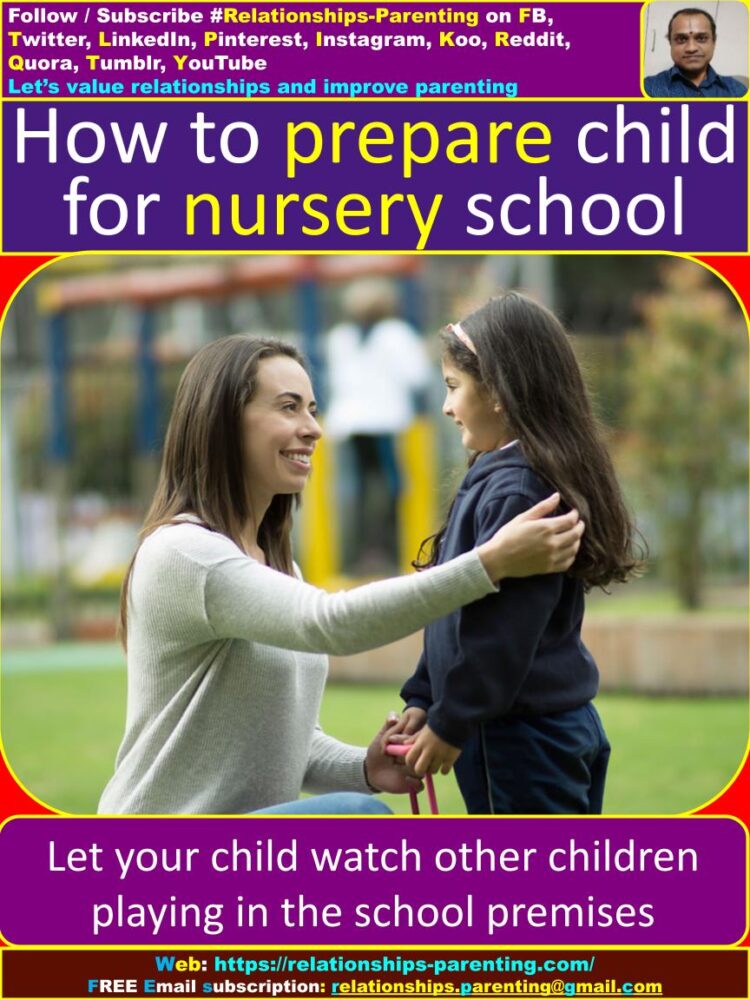
Make new friends in and outside school : Before your child starts going to school, let him/her make some friends inside and outside the school.
As a parent, make sure you arrange a play date with kids from your child’s class and from your neighborhood, especially from the child’s class.
This allows your child to learn about other children before school starts. This will make your child feel more confident and comfortable. Children will feel more and more relaxed when they mingle with other children.
This young age is not only for reading and writing, but also for playing with other children. More and more they socialize with other children, they gradually feel happy and satisfied with other children.
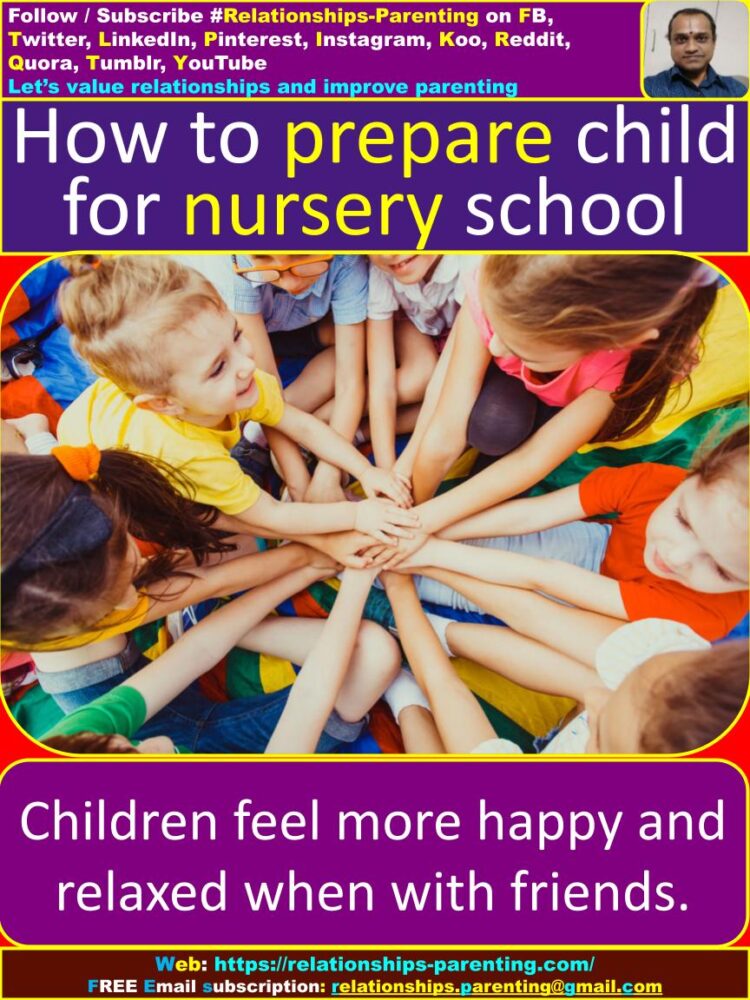
Tell them about the new change : As a parent, talk gently and caringly to your child about school in an enthusiastic way. Let them understand what happens at school if they go to school and advise them about new friends.
Let them know that even without your (parents) presence they can be happy and enjoy schooling with other friends. It’s good to talk about what to expect at school, but don’t ‘over-prepare’ your child right away.
This may cause discomfort in your baby. Help your child play more with other children. Playing is a great way to keep all your child’s stress levels and discomfort at bay.
You can take your child to parks and recreation classes to interact with other children in a more organized manner. Practice sharing. Sharing is the best and most divine way to improve your child’s behavior.
Let your child share his/her food with his other classmates and neighborhood friends. It will definitely help your child build a good character today and in the future.
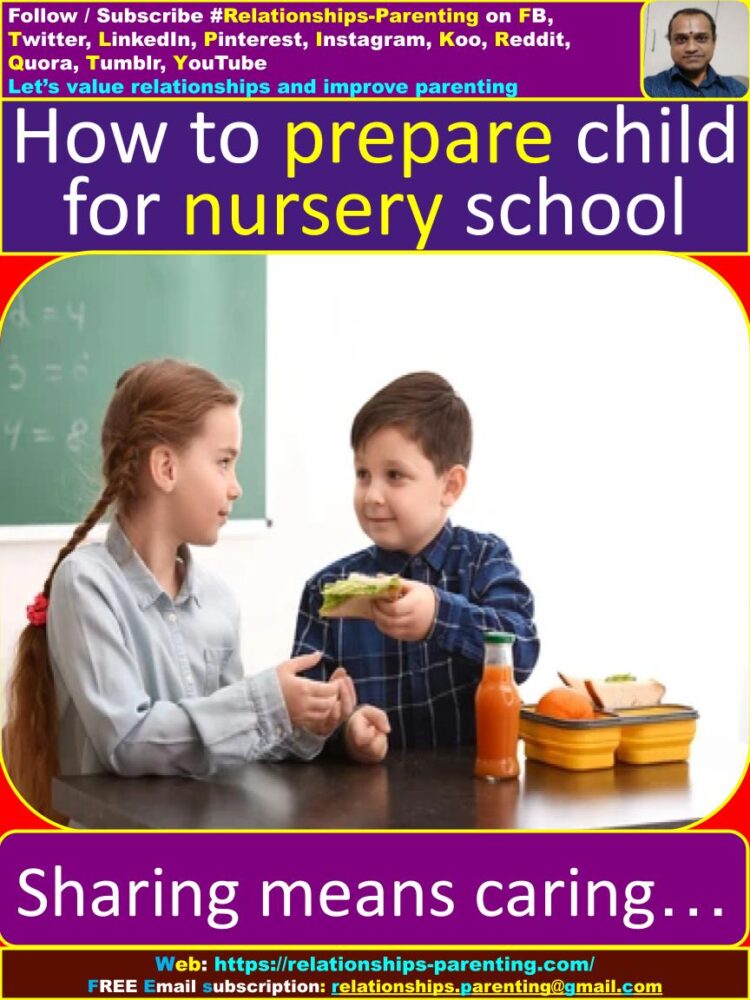
Share your experience with photos : Tell your beautiful children stories about how you felt when you first went to school and the special memories you made during that time.
While showing the photos, you can explain about each picture. How is was taken? Who is in the photo? Who took it? etc. Similarly, you can show the photos of your child’s school which is available in their website.
Show photos of children playing at school and also activities and toys they look forward to having fun with. This will help your child become more familiar with nursery school before they start.
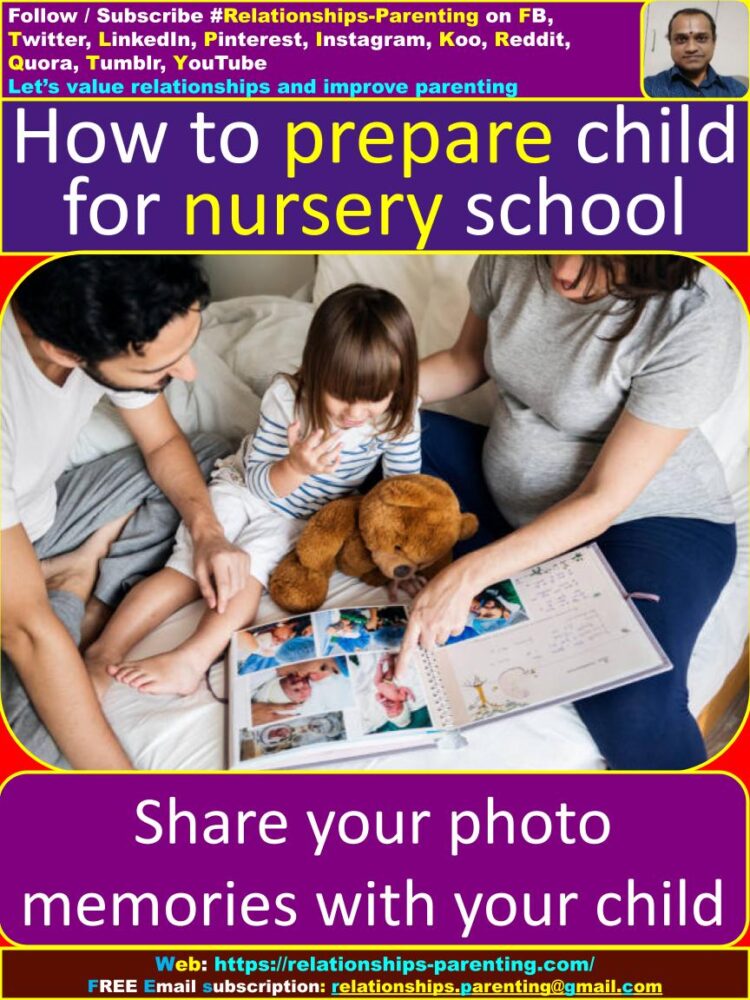
Bring school (play) to home : Playing with your child is always fun. This will greatly improve your relationship with your child. Play with your child as his/her own friend plays with him/her at school.
You be your child’s best friend. Spend time sharing rhymes, songs, stories and games to develop their speaking and listening skills.
Encourage them to learn to listen carefully, develop concentration, respond to questions and instructions. Similarly, teach them to share ideas and experiences and participate in conversations.
Inspiring your child’s artistic side is not only fun for both of you, but it also helps develop fine and gross motor skills, which are important at the start of school.
Help your child in coloring, drawing, sculpting and painting. All these will help your child and they will enjoy it. Try working together on art-related activities.
Your child will be more enthusiastic about art if you get to spend time together. If art isn’t your child’s interest, try other activities that build motor skills, such as using building blocks or putting puzzles together.
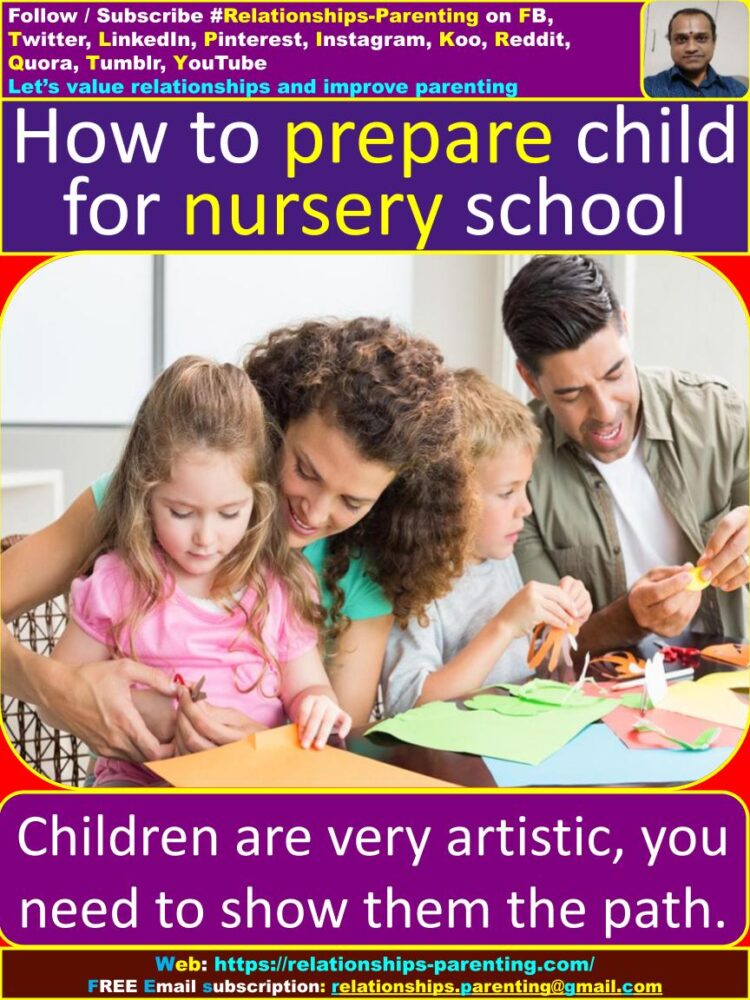
Play ‘getting ready skills’ like game : Teach your child to pack his/her own lunch box. Let him fasten his buttons and zips. Let her wear her own shoes. Always make all these look like a fun game to your child.
Of course, you need help with all these things in the beginning. But you have to make sure that your child learns these things and starts doing them on his/her own. The more your child can do on their own, the better.
Try turning learning dressing skills into a game. For example, you can see how fast your child can dress themselves and tie their shoes, then see if they can beat their previous best time. Be sure to show enthusiasm for the skills they do well.
Congratulations on all the work they do on their own. Practice eating independently. Your child’s nursery school would encourage independent eating for breakfast, lunch and snacks.
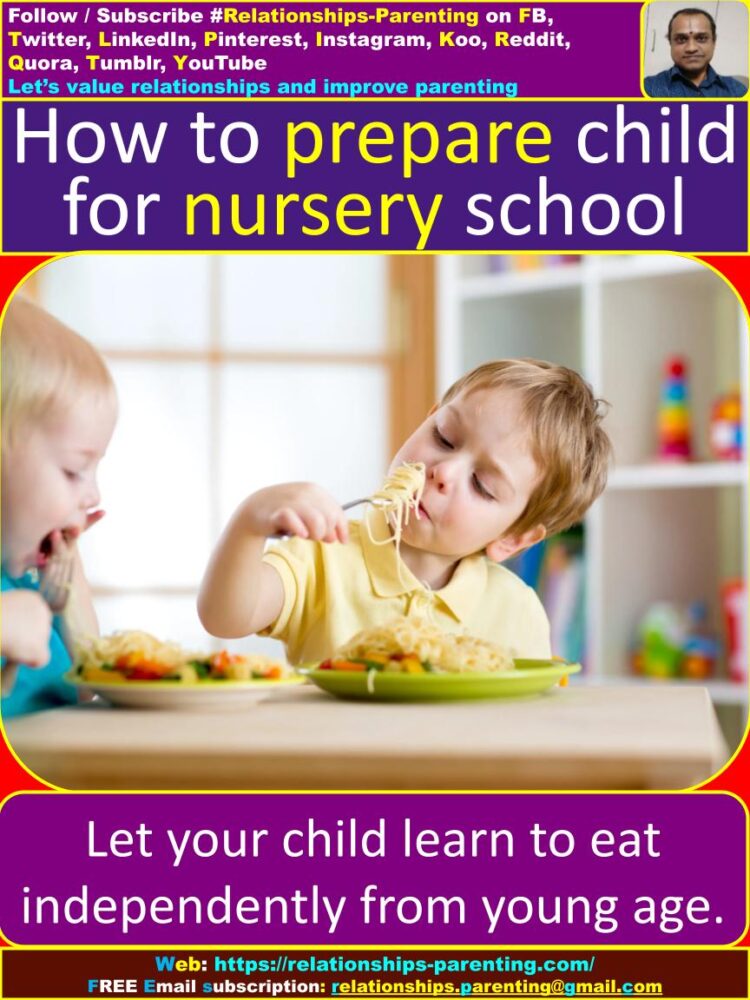
Ask what meals are served at your child’s nursery school and at what times. Try your best to prepare these meals and follow school timings at your home at least a couple of weeks before itself, so their body adjusts to the food and timings.
Your child should be able to listen to instructions of his/her teacher, because that is the only way the teacher can connect a class of children.
When your child is brushing their teeth, work on giving your child directions and getting them to follow them. Only if your baby’s teeth are good can they bite and chew food properly. Otherwise it will be difficult for your child.
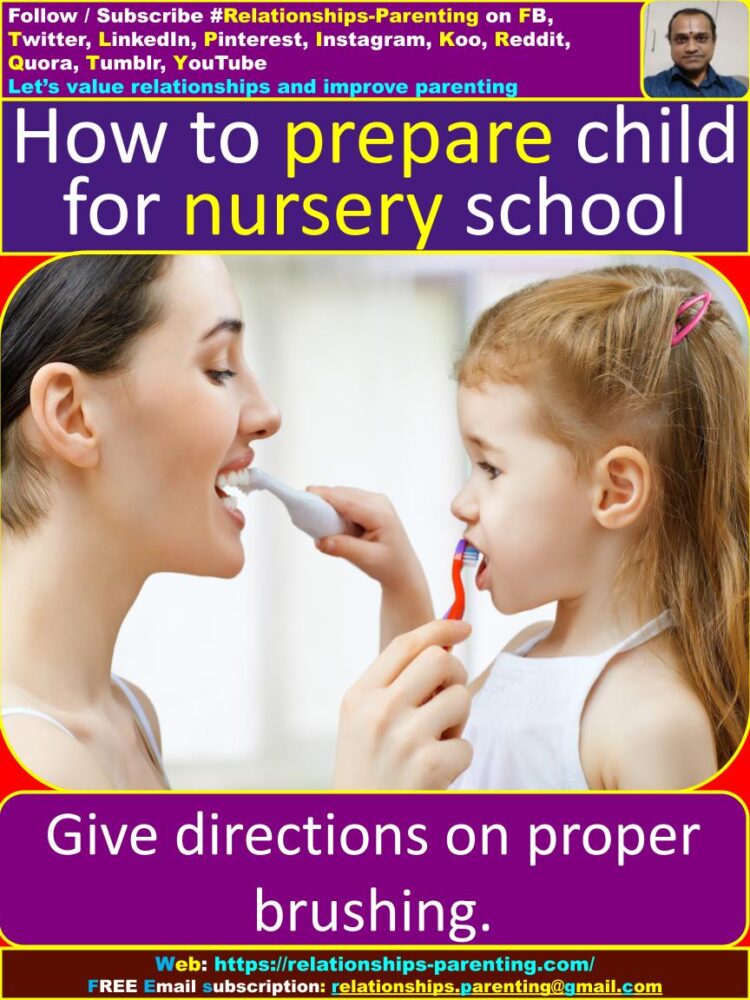
Create a new bedtime : Sleep and wake up time is very important as it shows your child the right way to go to school on time. Start practicing your child’s new bedtime and wake-up time for preschool a few weeks before school starts.
Choose a bedtime that allows for a good night’s rest and an early enough wake-up time, so you both don’t feel rushed in the morning. This must give both of you enough time to adjust.
Likewise, it should not affect your whole day’s activities. Try as much as possible to start a new schedule of making dress ready together the night before school and eating breakfast together in the morning.
This will save your own time enormously and you won’t want to be hurry in the morning. Most nursery school children take 1 afternoon nap. It keeps your baby relaxed and fresh every day.
Ask school officials what time children take naps, so you can adjust your child’s schedule a few weeks in advance. Try to engage and be active with your child in the morning. Your child should play with other children outside, for example in playground.
Instead of choosing a quieter activity like watching TV or playing a computer game, your child should play outside with other kids.
That way, they don’t want to sleep in the morning and are tired by afternoon. Ask the school authorities on what the children would sleep (like: bed, mat or crib). Get your baby used to sleeping on a similar surface at home.
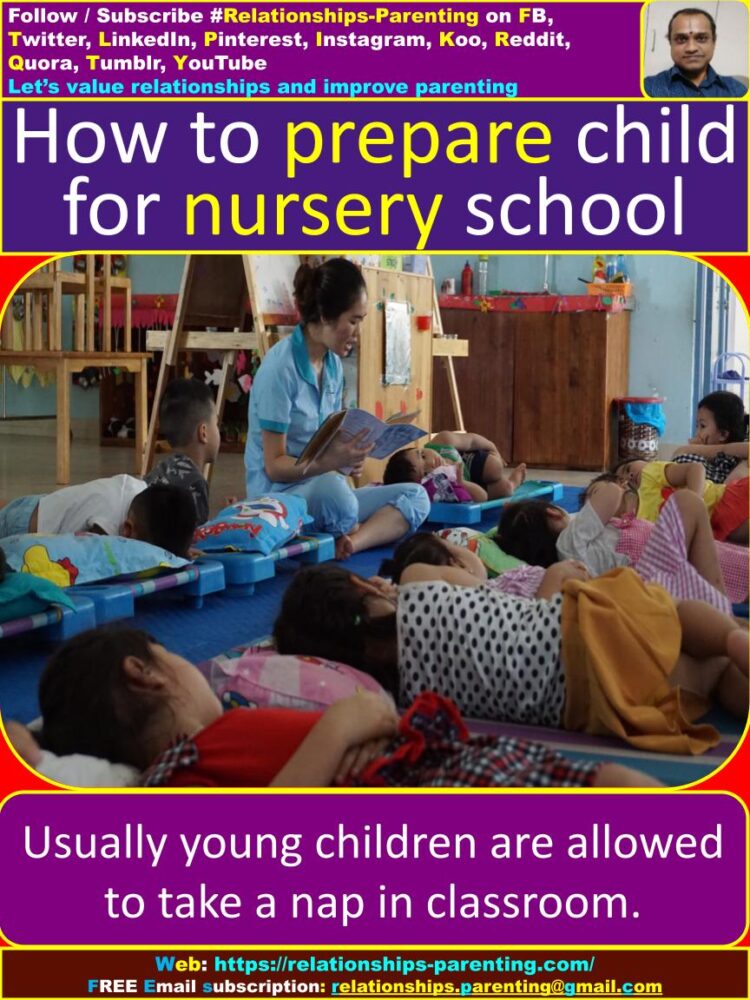
Listen to what your child wants to say : Always be assured that you should and must listen to your child first. Reassure your toddler that going to school, staying at school, and being excited or worried are normal.
Starting something new can make someone scary, but it can also be a lot of fun at the same time! Assure your kid that you will be there to pick him/her up at the end of the day and talk about his/her school activities.
Your child should be able to listen to instructions at school, as this is the only way to connect the teacher and student in the classroom.
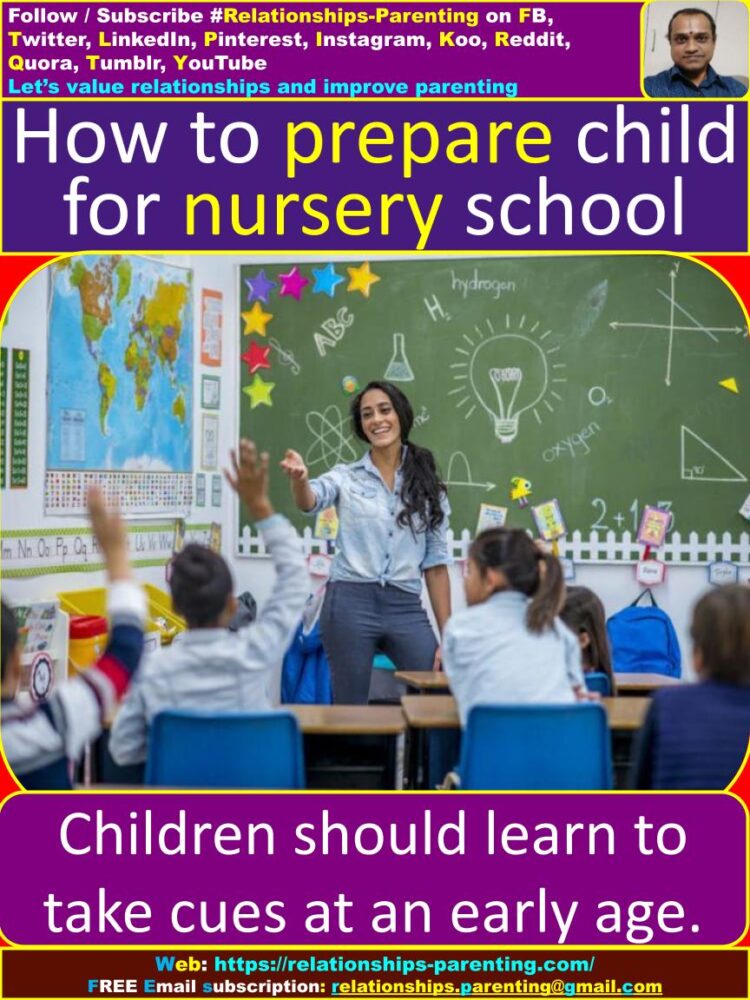
Encourage originality and creativity : Encouraging and motivating your child to do new, creative and original things is a great way to start nursery school.
Inspire your child’s artistic side, which helps them develop fine and gross motor skills, while also making it fun to work with your child, which is an important at the preschool period.
Drawing, painting, sketching, etc. can all help your child improve his artistic life and study skills, and most of all, it’s fun to do. Try to work together with your child.
Your child will be more enthusiastic about working together if you get to spend time with them. If art is not your child’s interest, try other activities that build motor skills, such as using building blocks or putting together a puzzle.
Similarly your child needs to add value by visualizing his creative side. This will boost your child’s confidence today and in the future.
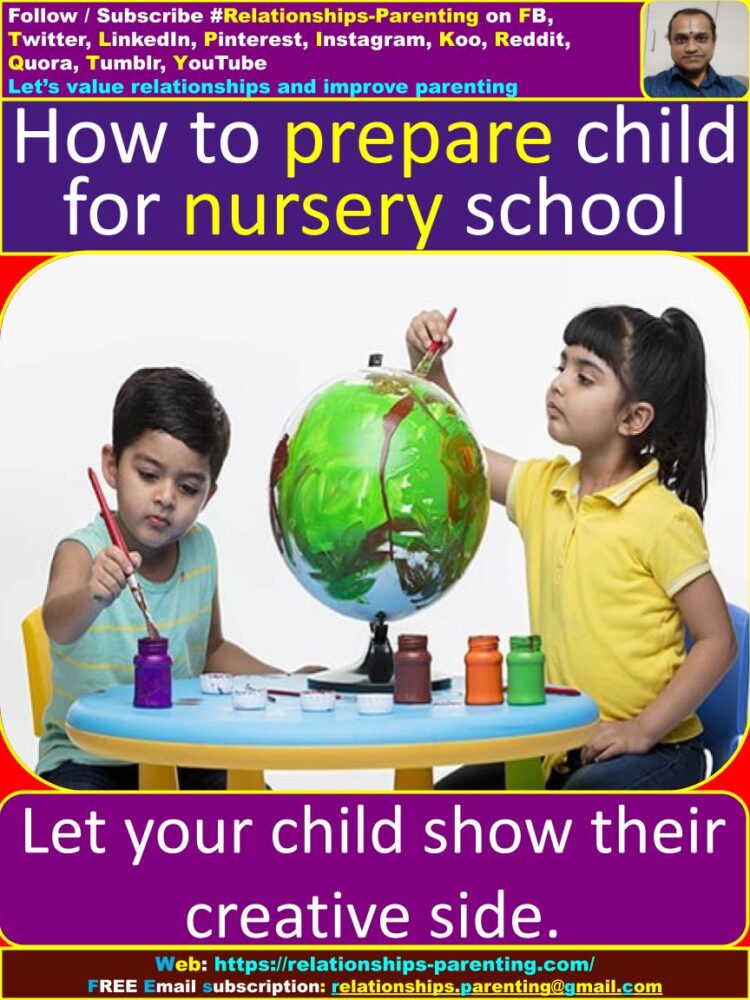
Pay attention to non-verbal messages : You child is still a toddler and won’t be able to open up his mind using his mouth. As much as 3-year-olds may talk, most are not yet able to fully explain how they are feeling or what they are worried about.
Your child may “manage” his worry by becoming clingy, withdrawn, or using more aggressive methods. Another common reaction when kids take a big step forward is actually moving backwards in some other area.
That is, they may perform one task very easily and complete other task(s) with great difficulty, or may not complete certain other tasks at all. For example, if your child is completely potty trained, he may start having dressing problems.
Although he can do these things very easily, he may ask you to feed him or dress him. It’s natural to be irritated with this backsliding behavior, and you may worry that if you do these things for him, he won’t go back to doing them himself later.
Remember that your baby is still very young and he needs his own sweet time. He may need a lot of support, nurturing and patience from you as he makes this transition.
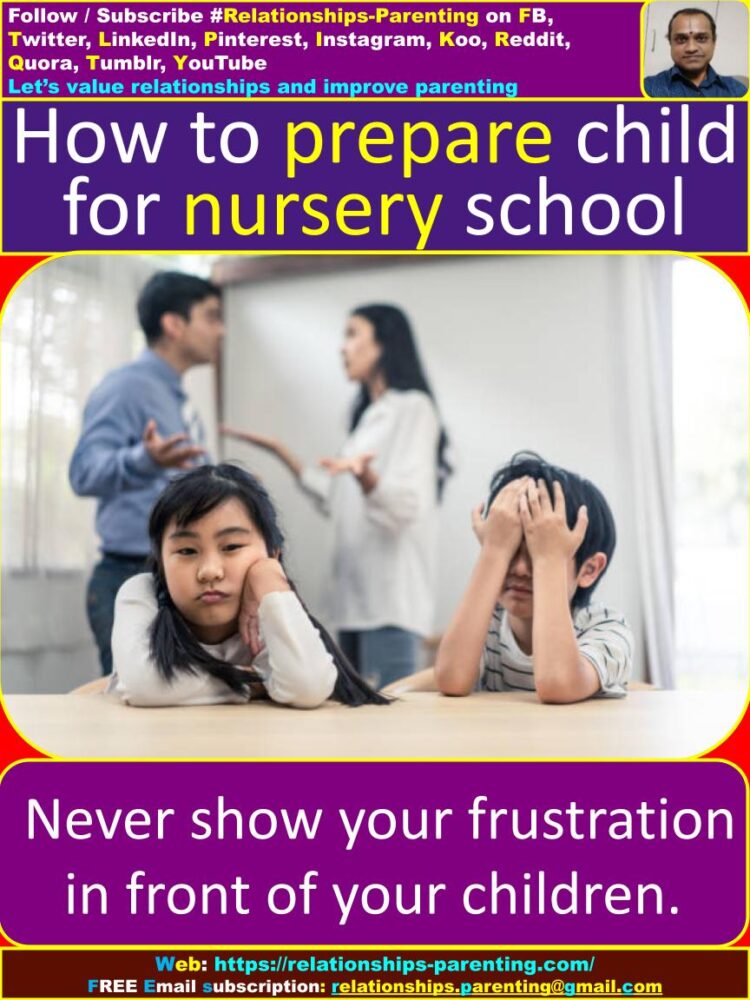
Keep your tone low and positive : Children need your calm mind, soft words and carefulness. You should think twice before using offensive words in front of your child.
You should keep your mind cool and calm and never show your irritation or frustration in front of your kid. You should always use soft words and completely avoid harsh and unnecessary words in front of your baby.
Children take feedback from trusted adults in their lives, especially family members like father, mother, grandfather, grandmother, brother, sister, etc.
So try not to look worried or disappointed and don’t linger too long. Say goodbye quickly, cheerfully, and reassure your child that all is well.
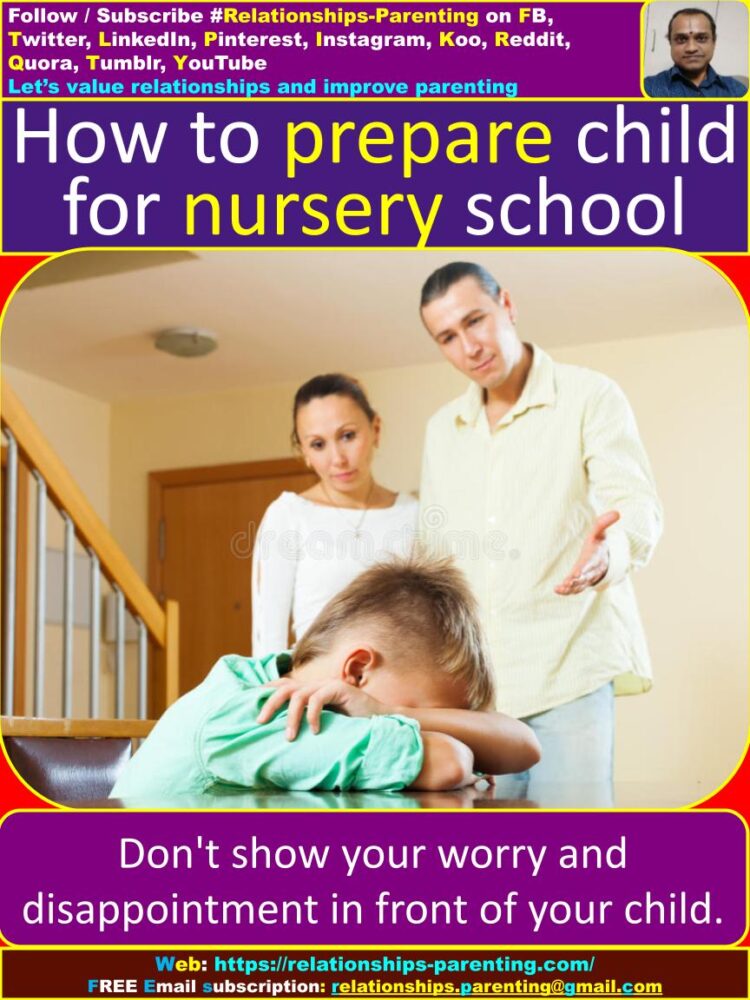
Resist your emotions : Try not to return to the classroom if you hear your child crying or yelling, as this can be normal with toddlers. Remember that this is the beginning of a big change in your child’s life.
Your child may feel understandably sad and a little scared at first. But if you turn your back on your child, it sends the message that he can’t take care of himself if you’re not with him.
And this is likely to increase your child’s suffering and make it difficult for him to adapt to the new changes of today and tomorrow.
Rest assured that teachers have tons of years of experience helping families make the transition to preschool. Instead, you can wait outside the classroom for a few minutes to make sure everything is OK, or call the school officials later to check in.
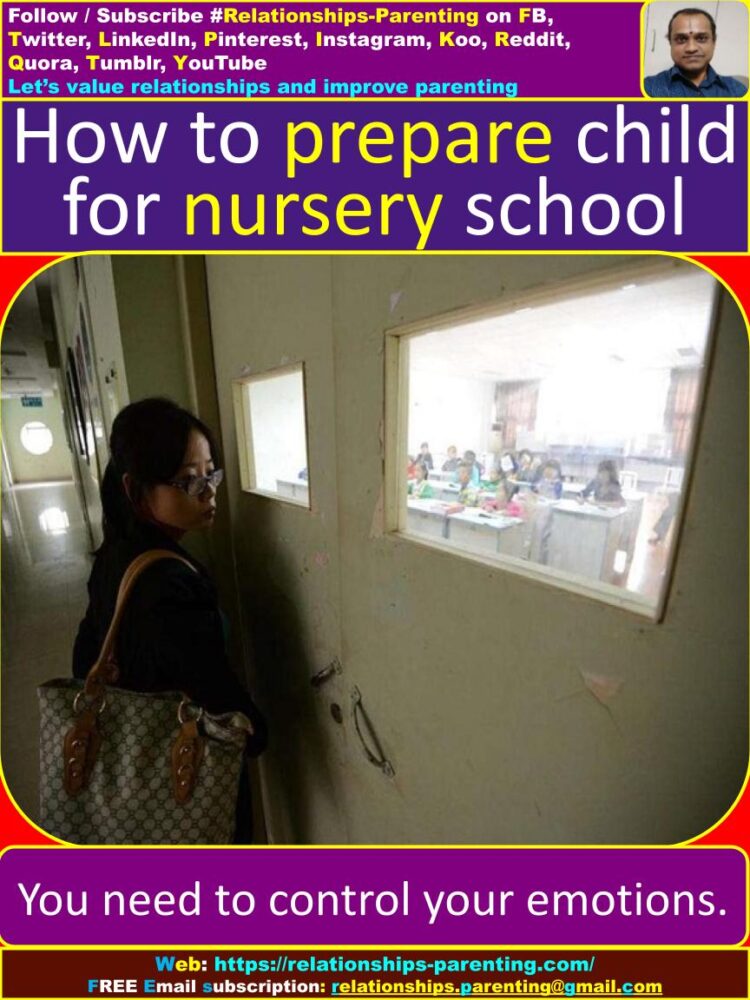
Have a smiling “bye” plan : In the beginning, saying goodbye can be difficult for you and your baby! When that time comes, try to keep your breakup quick, smiling and positive. Reassure your child that you will see each other again soon and feed him his most favorite food.
To avoid any awkward “goodbyes,” think of a creative way to say a special goodbye to your child. You can also have a special routine of comforting your baby, like giving your child a kiss or a special handshake.
You can give your baby a kiss on the palm to “hold” throughout the day. Or, the two of you can sing a special song together before you leave.
Goodbye routines comfort children and help them understand and prepare for what comes next. Thus, always have a simple, smiling, confident “goodbye” to your child.
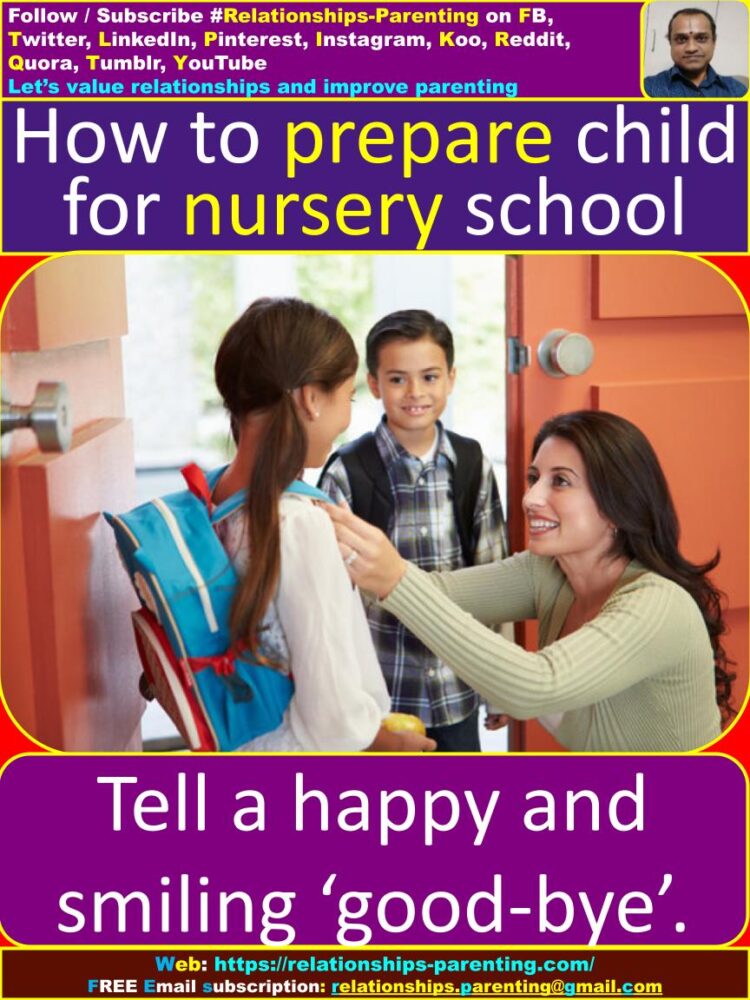
Origin of the nursery school (preschool) : There was a time when schools were restricted to such children who had already learned to read and write at home (affluent parents’ children).
Thus later, a time started when many attempts were made to make school accessible to orphans and for the children whose mothers’ were working in the factories.
In 1779 at Strasbourg (France), Johann Friedrich Oberlin and Louis Schepler founded an establishment to care for and educate preschool children. These children came from parents who were working and could not provide basic education to their children.
At the same time, in 1780, similar infant institutions were established in Bavaria (Germany). In 1802, Pauline zur Lippe founded a preschool center in Detmold (Germany). Similarly many others too established different educational institutions all over Europe.

More information will be added to this on regular basis. Please visit this post and blog / website to know more about relationship and parenting.
Continue reading about:
To know more about “Husband and wife information, facts“, please click the below link:
Husband and wife information, facts
Dear friends, if you need any clarifications about this post, kindly let me know, I will definitely try to answer all of them.
Also add your COMMENT below, SHARE on different SOCIAL MEDIA networks.
This will help to know the quality of this content and also it will be helpful to know if any improvements is required for the content.
If you feel this content is useful to you and has helped you to improve your knowledge, kindly share this with your well-wishers.
Because “SHARING MEANS CARING”.
To receive FREE EMAIL SUBSCRIPTION about #Relationship #Parenting, you can send an email to [email protected] from your email ID.
Let you and your well-wishers live a prosperous, healthy and fearless life through out your life term.